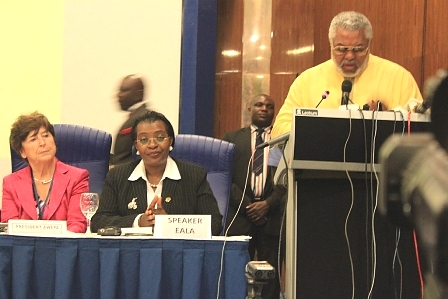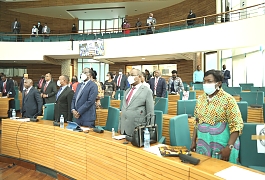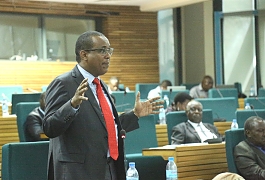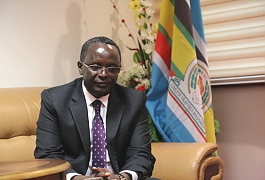A two-day International Parliamentary Conference on emerging democracies in Africa commenced in Abuja, Nigeria today with a call for the strengthening of democratic institutions, legitimacy in leadership, rule of law and for states to endure to accountability, availability of choices and values.
Ghana’s former President, H.E. Jerry Rawlings maintained that an independent judiciary, impartial security services, a well-oiled and independent media and vibrant, non-partisan civil society were key ingredients to ensure a fledgling democracy. In his keynote speech entitled: Emerging Democracies; Challenges and Opportunities, H.E. Rawlings emphasised that emerging democracies were grappling with problems of incoherent constitutions and weak institutions and called for a ‘change of tide’ in the democratic dispensation to guarantee freedom and justice for the continent.
‘The judicial and security services are not free of excessive control. We are also saddled with civil society who instead of exposing ills in government and society, rather metamorphose into political parties entities - attacking or overprotecting government as if their survival depended on it’, Mr. Rawlings noted.
The former Head of State noted that past occurrences in Kenya and Cote d’Ivoire and the recent developments in Libya, Tunisia and Egypt call for a thorough revision of political processes and structures in the countries.
‘Kenya has learnt many lessons from the post electoral violence of 2007 which had huge connotations. The Constitution has been reviewed and political tolerance was tested through a unity government. Nigeria has made strides over the past decade politically but still faces many complicated challenges with socio-cultural implications that have been ignored for a significant period’, the former Head of State remarked.
H.E. Mr. Rawlings urged the legislative assemblies and parliaments to competently base their debates on emerging issues and decried the often handicap of information. He further urged participants to go for the strengthening of institutions in their respective countries’ constitutions. ‘While the legislatures can enact laws that empower institutions, constitutional entrenchment of such provisions would ensure that political parties with majority control within legislative assemblies do not manipulate the powers of the institutions’, Mr. Rawlings said.
In his opening remarks, the President of the Nigerian Senate and Chairman of the National Assembly, Dr David Mark maintained that democracy was on the verge of taking root in the continent and that it would eternally remain irreplaceable. However, despite the lofty achievements, the Senate President called for adherence to the rule of Law, separation of powers, periodic elections, a free press and a dynamic civil society.
‘We must note that dictatorship reverses economic growth and strangles development to the emancipation of social democracy among others’, the Senate President noted.
Dr Mark noted that a strong independent legislature to carry out oversight was vital in addition to playing its effective role of legislation, representation and oversight.
The high profile conference is attended by eminent persons and former Presidents, Speakers of the regional and national assemblies, legislators, senators and high ranking government officials.
The Speaker of EALA, Rt. Hon Margaret Nantongo Zziwa is also in attendance. Parliaments of Zimbabwe, Uganda, South Sudan, Senegal and Mauritania are represented. Other legislators from the Assemblies of Guinea Bissau, Lesotho, Liberia, Malawi and Ghana are also taking part. Over 300 Parliamentarians are in attendance.
The two day conference is organised by the National Institute of Legislative Studies (Nigeria National Assembly) in conjunction with the European Parliamentarians with Africa (AWEPA) and the Parliamentary Centre, Canada.
In his speech, the former President of the Federal Republic of Nigeria, H.E. Chief Ernest Shonekan remarked that pervasive corruption hindered democracy and called for complete eradication of the vice. He noted that democracy often matures over time and that there was need for improving conditions of living including social economic transformation, infrastructure and political growth.
‘There is similarly need and the room for improvement in political appointments and governments and let us open up space for constructive criticism in political parties. This should and must include appointments for women in high positions’, the former Head of State said.
In her remarks, the President of the Association for European Parliamentarians with Africa (AWEPA), Hon Miet Smet remarked that democracy remained key towards promoting economic growth, reducing risks for investors and in increasing market potential.
“The democratisation process is long and difficult. It is not easy to convince belligerents to trust each other and to share power for the greater good of the nation. But democracy processes encourage open dialogue and free speech, which in turn holds leaders to account for their actions and decisions’, the AWEPA President and Minister for State in Belgium remarked.
Other topics to be discussed at the two day conference include managing conflicts, reversing youth unemployment and violence in Africa, delivering on infrastructure and social services in Africa and opening up political competition and effective participation.
Meanwhile, AWEPA signed a Memorandum of Understanding with the National Institute of Legislative Studies (NILS) and the Economic Community of Western African States (ECOWAS) Parliament respectively on the sidelines of the meeting. The MoU with NILS envisages collaboration and strong links in the scope of the Millennium Development Goals (MDGs) and the post 2015 framework with an emphasis on women’s rights and empowerment. The MoU shall see both parties collaborate in holding annual African Legislative Summits and relevant conferences on emerging democracies over a ten year period.
The agreement with ECOWAS Parliament on its part stipulates co-operation in parliamentary programmes geared to strengthen ECOWAS as a regional and legislative institution and in oversight of regional development assistance relationships to oversee the implementation of MDGs.
-End
For more Information, contact: Bobi Odiko, Senior Public Relations Officer; East African Legislative Assembly; Tel: +255-27-2508240 Cell: +255 787 870945, +254-733-718036 (roaming in Abuja, Nigeria); Email: bodiko@eachq.org Web: https://www.eala.org Arusha, Tanzania




